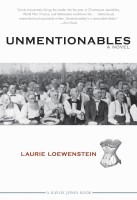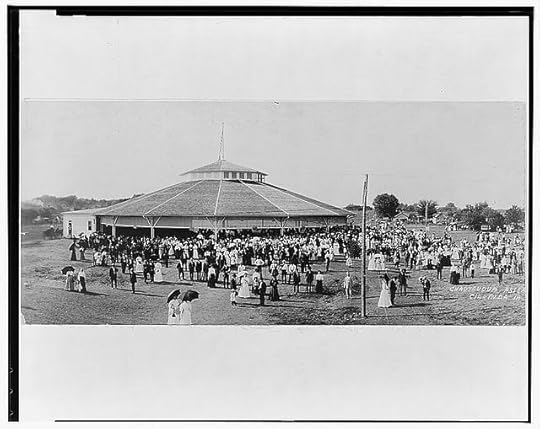Unmentionables by Laurie Loewenstein
Unmentionables begins with a bit of a bang as main character Marian Adams presents a speech to the fine Midwestern folk of Emporia on the impossibility of women's undergarments. In 1917 this is indeed an "unmentionable" topic and yet as Marian speaks, it makes perfect sense--women are literally being dragged down to the ground by the clothing society requires them to wear. How can they ever succeed? How they can achieve anything when it takes so much simply to move around?
Marian's comments are received differently by those in attendance, although as part of the weeklong traveling Chatautauqua assembly, they are accustomed to being challenged now and again by a few outrageous (to them) ideas. The idea is that someone like Marian will drop into their lives, share her opinions and then move on to the next town. Marian stumbles while climbing off the stage however and severely sprains her ankle. She ends up spending several days in Emporia and lives, including her own, are upended by this intrusion.
 In many ways, Unmentionables is a standard smalltown drama. There is the newspaper editor, a widower, and his difficult relationship with his wealthy father-in-law. His grown stepdaughter is desperate to break out on her own but her grandfather insists on keeping her under his thumb. The next door neighbors (brother and sister) are tangled up in their issues; she has an unrequited love for the newspaperman and he is a rather fickle businessman who owes a debt that he does a poor job of paying attention to.
In many ways, Unmentionables is a standard smalltown drama. There is the newspaper editor, a widower, and his difficult relationship with his wealthy father-in-law. His grown stepdaughter is desperate to break out on her own but her grandfather insists on keeping her under his thumb. The next door neighbors (brother and sister) are tangled up in their issues; she has an unrequited love for the newspaperman and he is a rather fickle businessman who owes a debt that he does a poor job of paying attention to.
The rest of the town is filled with people good and bad, there is generosity and pettiness and, in this time of war, some startling cruelty. Page by page, Loewenstein tosses out much of the difficult times, truly immersing her readers in the cares of 1917. She also shows deep affection for her characters, especially Marian, "Deuce" and Helen, who dreams of joining the suffragist cause.
This is a period that begs for great sweeping novels and I was especially happy to lose myself in the lives of these interesting people. The whole notion of Chautauqua and the "adult improvement" period appeals to me (traveling speakers under huge tents!). There were so many ideas, good and bad, swirling about the world in that time, questions that had to be considered and great strides about to be taken. Just think of the layers of clothing women wore in 1917 and then how much of that changed by 1927. The world was spinning so fast in the teens - women about to vote!!! Yet Lowenstein brings it all down to a level that makes the issues sharply personal. And then Marian goes to France to make her mark and that is some daring stuff as well.
(I especially liked that she carried Emporia with her even to France and the letters exchanged between the two places are a lovely touch.)
I found a certain amount of "earthiness" to this novel--a perspective on life that reads very much about people most readers know and will recognize. There are heroes and villains (plus a dog that dies to prove just how dastardly one villain truly is which, as you know, I hate to find any novel), and some hard won victories. I think I especially liked the history here though, how Lowenstein so effectively weaves bits about milk inspection and disease and racism and education into the overall story. This is how we live, after all, with so much big and small going on around us.
[Post pic of Chautauqua Assembly in Clarinda, Indiana circa 1908. Courtesy Library of Congress.]





